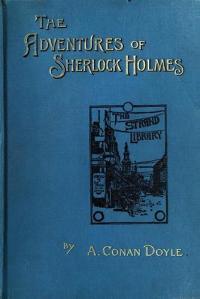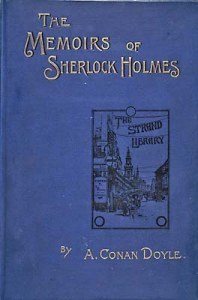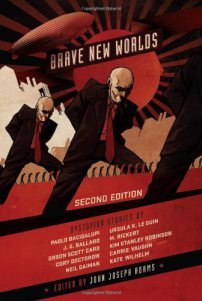Maria Haskins's Blog, page 57
June 5, 2015
“If you love this, you are wonderfully crazy” – my review of Gene Wolfe’s ‘Soldier of the Mist’

June 3, 2015
My summer reading list – a work in progress + current reading

June 1, 2015
Two classic science fiction short story collections: ‘I, Robot’ & ‘The Martian Chronicles’

May 30, 2015
My first book giveaway: enter to win a copy of ODIN’S EYE at Goodreads!

May 29, 2015
The joy of holding ODIN’S EYE in my hand

Dragons, compassion & magic – a review of J. MICHAEL RADCLIFFE’S short story ‘Scale of a Dragon’

May 27, 2015
Brine, ships & harpoon-wielding mermaids – a review of Lisa L. Hannett’s short story ‘A Shot Of Salt Water’

May 25, 2015
Criminally classic short stories – The Adventures & Memoirs of Sherlock Holmes, by Arthur Conan Doyle
“I think of slaying Holmes … and winding him up for good and all. He takes my mind from better things.”
-Arthur Conan Doyle in a letter to his mother, 1891
Inventing a fabulously popular literary character, and then getting paid big bucks to write stories about him would seem to be a dream come true for many writers, but it doesn’t make everyone happy. Just consider the curious case of Arthur Conan Doyle, the British writer and doctor who invented the very brilliant, somewhat odd, and frighteningly intelligent private detective Sherlock Holmes, and his supportive, but somewhat less brilliant, sidekick Dr. Watson.
The short stories about Holmes were first published as a serial in The Strand Magazine, and they soon became insanely popular. However, it wasn’t just the fictional master-criminal Moriarty who wanted to get rid of Sherlock Holmes: Conan Doyle planned to kill him for years before finally hurling him over the Reichenbach Falls in Switzerland in the short story “The Final Problem”.
Conan Doyle didn’t hate Holmes all the time, but he seems to have eventually tired of all the attention the stories attracted, and resented how much of his time was taken up by writing them. In a letter to a friend he wrote:
“I have had such an overdose of [Holmes] that I feel towards him as I do towards pâté de foie gras, of which I once ate too much, so that the name of it gives me a sickly feeling to this day.”
He wanted to be known for, and have more time to work on, his other literary endeavours, like his historical novels. At one point he even asked his publisher for a what he thought was a ridiculous raise, hoping to discourage them from wanting any more Sherlock Holmes stories. Instead, he became one of the highest paid writers at the time.
When Holmes died in the short story “The Final Problem”, many fans were outraged (a reaction that sort of reminds me of how certain fandoms can blow up these days when a popular TV- or movie-character bites the dust). Readers, and Conan Doyle’s publisher, pestered him for years to write new stories about Holmes. Eventually, he relented and brought Sherlock back to life: Plot twist! He wasn’t really dead after all! He had just tricked everybody (including poor old Watson).
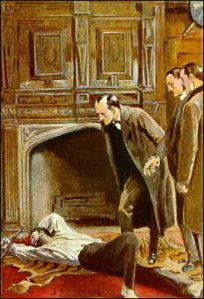
Sidney Paget illustration of Holmes for “The Adventure of the Abbey Grange”.
In total, Conan Doyle wrote four novels and 56 short stories featuring Holmes. The novels are good (The Hound of the Baskervilles is my favourite Holmes-novel), but it’s really the short stories that are the meat and potatoes of Sherlock Holmes the character and Holmes-lore, at least to me. And I think the best short stories are the first ones, the ones that are included in The Adventures of Sherlock Holmes (made up of short stories published 1891-1892), and The Memoirs of Sherlock Holmes (short stories published 1892-1893).
There are so many classic short stories in these collections: “A Scandal in Bohemia” with the devious Irene Adler, the rather lighthearted “The Red-Headed League”, strange cases like “The Engineers Thumb” and “The Silver Blaze, and “The Yellow Face” where Holmes actually comes to the wrong conclusion. Throughout, Doyle masterfully manages to keep you hooked on Holmes’ investigations into all these baffling mysteries and crimes, weaving in atmospheric details of old-school London and England (hansoms! hats! opium dens!), and astonishing the reader with Holmes’ amazing skills of observation and deduction.
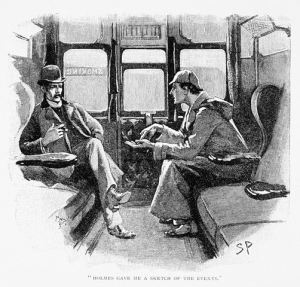
Holmes and Watson in a Sidney Paget illustration for “Silver Blaze”
In my mind, Doyle’s best invention and most effective literary device is Sherlock Holmes himself. Even today, that kind of “Sherlock Holmes-ian character”: a brilliant crime-solver with odd habits and a somewhat superior manner, is a staple of crime fiction, both in movies and books. And his methods, like gathering and analyzing evidence from the crime scene, and studying the details of a person’s behaviour and appearance to draw conclusions about them, are now standard police procedure, of course.
Another thing I really appreciate about Holmes is that he is not really all that likable. Some writers make the mistake of writing their protagonists as too-perfect. They are everything, all the time: insightful, kind, funny, good-looking, strong, etc. Conan Doyle on the other hand makes Holmes a rather arrogant and overbearing genius who doesn’t always treat even his good friend Watson (or his loyal housekeeper!) in the best way. And he has bad habits, like being very untidy, excessive pipe-smoking, and cocaine use. Dr Watson is more likable, of course, and provides the reader with a more regular human perspective on Sherlock Holmes, the complex investigations he becomes involved in, as well as the strange methods he uses.
The combination of these two personalities, and the rock-solid friendship and partnership between them, is a key to why these stories work so well, I think. While the mysteries themselves are interesting, my main joy when I read Conan Doyle’s short stories is that I get to spend time in the company of Holmes and Watson.
It is well worth revisiting these old short stories: they remain highly readable and hugely enjoyable more than a century after they were written. Arthur Conan Doyle’s short stories are available in many different editions, for example:
The Adventures of Sherlock Holmes
The Memoirs of Sherlock Holmes
The Complete Sherlock Holmes
The Complete Sherlock Holmes (Illustrated)

May 23, 2015
Poem in progress: Water

Water
I am the surface in between –
mirrored sky
rippled depth
only a reflection –
cupped
in the palm of my hand.
And under, underneath, underneath me
are
the mute and the blind
the unseen and the unsaid,
the white teeth bared,
pale dreams glistening unsheathed,
the taste of blood on the knife’s edge
between the tongue and the scream.
When it’s quiet, quiet like this,
a space in between,
sun cutting through,
bright eye peering down,
I can feel
the distant calls of birds,
sharp, like needles, touching my skin,
black ciphers,
spider veins traced
on my shivering hide.
Copyright Maria Haskins 2015

May 22, 2015
BRAVE NEW WORLDS – gripping dystopian sci-fi stories from new & old writers
Short story anthologies are a staple of the science fiction world, and if shop for ebooks, they are almost literally a dime a dozen! Brave New Worlds is a great anthology with a theme: dystopian stories. Dystopian is the opposite of utopian, so many of these tales are dark, bleak, and chilling. They are also very good, and some are classics in the science fiction genre. To quote the book blurb at Amazon:
Brave New Worlds collects the best tales of totalitarian menace by some of today’s most visionary writers, including Neil Gaiman, Paolo Bacigalupi, Orson Scott Card, Kim Stanley Robinson, and Ursula K. Le Guin.
What I really loved about this book was that it mixes new and old writers, and brings some fantastic stories from writers I’d never heard of, as well as some of the masters of the genre. There’s also a nice intro for each story, introducing the story and the author, and I found that both interesting and helpful.
There are a lot of great short stories in this collection and a highly recommend it for any and all science-fiction fans, but I’ll pick out 5 stories that were stand-outs for me:
The Lottery, by Shirley Jackson
This is a classic sci-fi short story, and it reminds me of some of Ray Bradbury’s best work: that everyday, early 20th century world, with a dark and chilling twist. It has certainly inspired other writers, and I would even say that The Hunger Games is a story much in the same vein as The Lottery.
The Ones Who Walk Away From Omelas, by Ursula K. Le Guin
Another classic science fiction tale, and vintage Le Guin. At first, this story seems utopian rather than dystopian… but of course there is a flaw hidden deep beneath, and deep inside even in this perfect society. Le Guin’s writing is flawless as she builds up a beautiful world, and then rips it open. The ending is open to interpretation, and this is most certainly a story that stayed with me.
The Funeral, Kate Wilhelm
This short story is set in a future society, heavily regimented and strictly controlled from the top down, where people are classified into different groups and equality isn’t even a dream anymore. The main character is a girl called Clara, who searches for an almost forgotten, and almost lost secret, hidden in a mysterious cave. Clara is a fantastic character: complex and compelling, and Wilhelm shows her writing chops by building a believable, complex world and populating it with such memorable characters, all within the space of a short story. A highly recommended read!
Amaryllis, by Carrie Vaughn
Many of the stories in this book are rather on the dark side: it is a collection of dystopian short stories after all. But ‘Amaryllis’ is a bit different. In the story, ‘Amaryllis’ is a fishing boat, and like several other of the stories in this collection, it deals with how a future society might try to control the population by restricting who is allowed to get pregnant. However, this story still has something of a happy glow to it: not a utopia, perhaps, but at least a world that leaves some space for hope and love and compassion.
Evidence of Love In A Case of Abandonment, by M. Rickert
This story is set in a future America where women’s rights have been severely curtailed and restricted. Reproductive freedom is gone, and if you do not obey the rules (or if you did not obey them in the past), the punishment is swift and brutal. The story is told from the perspective of a young girl. Her mother has gone missing, and the reason for her disappearance might be that she once broke the rules and is now being hunted. Rickert puts us inside the girl’s mind, as she tries to deal with what has happened to her mother, and what is happening to many other women around her. Another highly recommended read!
Get the book from Amazon – in paperback or as an ebook:
Brave New Worlds (Dystopian Stories)
Find out more about the 5 writers mentioned above:
Shirley Jackson
Ursula K. Le Guin
Kate Wilhelm
Carrie Vaughn
M. Rickert


